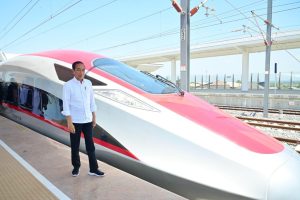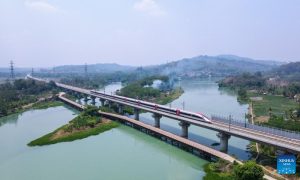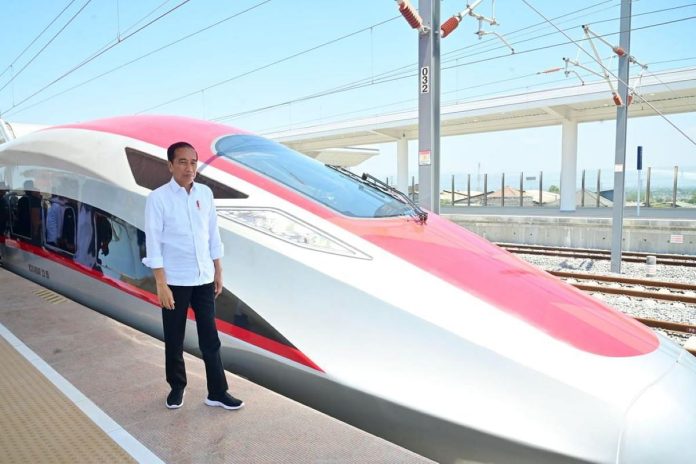Indonesian President Joko “Jokowi” Widodo today (October 2) inaugurated the 142-kilometre (88.23-mile) Jakarta-Bandung High-Speed Railway (HSR), the first HSR in Indonesia and Southeast Asia.
Widodo launched the official operation of the Jakarta-Bandung HSR at Halim Station in Jakarta.
Widodo announced that the HSR network will be called “Whoosh”(inspired by the sound of the train).
The high-speed rail line was developed at an estimated cost of a $7.3 billion.


Widodo termed the launch of the high-speed train as a critical milestone in modernising Indonesia’s transportation system, which is efficient, environmentally friendly and integrated with other public transportation networks.
Indonesian President Joko “Jokowi” Widodo at the launchJakarta-Bandung High-Speed Railway (HSR)
Last week, the Indonesian Transportation Ministry issued an operating license Friday to PT Kereta Cepat Indonesia-China (KCIC), a consortium of Indonesian and Chinese firms responsible for developing and operating the Jakarta-Bandung HSR line.
The Jakarta-Bandung high-speed rail service will reduce the travel time between the two cities from three hours to 40 minutes. The train will run at an approximate speed between 200 kmph and 350 kmph.
Daily passenger flow on the rail link is expected to be 44,000 on average, which is set to increase in later years.
More than 80 km of the total length of the railway line will be elevated, while the remaining will be through 13 tunnels and subgrades.

The HSR passes through the hinterlands of West Java province and has several stops, including Halim, Karawang, Padalarang and Tegalluar.
Chinese-funded project as part of BRI
The project is a part of China’s strategic Belt and Road infrastructure initiative, with 75 per cent of the cost funded via a loan from the China Development Bank. The remaining 25 per cent is the consortium’s funds. The Chinese loan will be for 40 years with a ten-year grace period.
KCIC was set up in October 2015 as a consortium of four Indonesian state-owned companies and China Railway International, a subsidiary of China Railway Group (CREC). While Indonesian entities hold 60 per cent equity in the joint venture, the Chinese firm holds the remaining 40 per cent equity.
In November 2022, KCIC sought a $1.03 billion loan top-up from the China Development Bank (CDB) to fund a budget overrun of the ambitious project.
In August 2022, the Indonesian government announced a gap funding of $274 million to PT KAI to expedite the project’s construction.
The Indonesian government picked China for the project due to its readiness to provide guarantee-free loans. Japan, which was also in the requested, lost out as it asked for Indonesian Government funding.
Delay In Commissioning
The project faced multiple delays and cost overruns due to various issues, including higher land acquisition costs, disruption in construction due to the pandemic, and rising materials prices.
The construction began in 2016, and the project was initially expected to complete by 2019. However, it has been hit by delays due to disputes that involved land acquisition and environmental issues.
Construction was also temporarily halted over safety fears after a weekend accident killed two Chinese workers and injured four other technicians.
In September, a set of Chinese-made train cars for the high-speed railway project reached Jakarta’s port. China’s CRRC Qingdao Sifang railway company designed and built the train cars.
Trial operations on the railway line were also conducted in September.
High-Speed Rail Project Developed In Phases
The 142-kilometre stretch connecting Jakarta, the country’s capital and Bandung, a city in West Java province, is part of the project’s first phase.
The overall project envisages the development of a 750 km high-speed train line that would cut across four provinces on the main island of Java and end in the country’s second-largest city of Surabaya.


